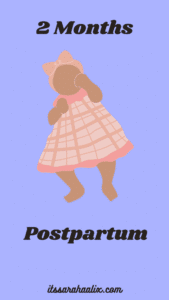This post is all about the unexpected challenges you might face 2 months postpartum!

Becoming a mother is an incredible journey filled with joy, love, and countless unforgettable moments. However, besides those incredible moments, there can also be some more difficult ones.
It’s a time of immense change, both physically and emotionally. Navigating through this phase requires strength, resilience, and a deep understanding of what lies ahead.
In this article, we will explore ten unexpected challenges you might face 2 months postpartum. From postpartum depression (also known as baby blues) to sleep deprivation, and hormonal changes to finding a new routine, we’ll delve into the realities of motherhood.
So buckle up, new moms, because we’re about to guide you through this rollercoaster ride and equip you with the tools to overcome these hurdles. By acknowledging and preparing for these challenges, you can take proactive steps toward a successful recovery. Remember to reach out for support, prioritize self-care, and celebrate every milestone along the way.
Let’s dive in and uncover what lies beyond the surface of those precious first weeks postpartum.
What to expect 2 months postpartum
Just as sleep plays a critical role in our overall well-being, it becomes a precious resource in the tumultuous postpartum period.
Coping with Sleep Deprivation
One of the most challenging aspects of the postpartum period is undoubtedly the lack of sleep that comes with caring for a newborn. As a new parent, you may find yourself navigating through a foggy haze, powered by sheer determination and multiple cups of coffee. The seemingly never-ending nights can feel like a never-ending loop of feedings, diaper changes, and soothing cries, leaving you feeling utterly exhausted.
The truth is, that sleep deprivation can take a toll on your physical and mental well-being. It’s not uncommon to experience mood swings, difficulty concentrating, and heightened stress levels as a result of sleep deficiency. While it may feel overwhelming at times, it’s important to remind yourself that this phase is temporary and that you’re not alone in this struggle.
Finding moments of rest and relaxation can be crucial in coping with sleep deprivation. Whenever possible, try to squeeze in naps during the day, even if they are short power naps. When your baby is sleeping, try to nap too!
Enlist the support of your partner, family, or friends to take shifts with nighttime feedings, so you can each have a chance to get some uninterrupted sleep. Investing in a good quality white noise machine or using earplugs can also help drown out any disturbances and create a more conducive sleep environment.
In addition to finding strategies to maximize your own sleep, it’s essential to prioritize self-care during this exhausting period. Simple acts such as taking a bath with warm water, indulging in a favorite hobby, or even just stepping outside for a breath of fresh air can provide small moments of respite and rejuvenation. Remember that taking care of yourself is not a luxury but a necessity, as it will directly impact your ability to care for your little one.
Dealing with Hormonal Changes
Your hormone levels will fluctuate during the postpartum period and it can bring about a rollercoaster of emotions. One moment, you might be overwhelmed with love and joy for your little one, and the next, you might find yourself angry or crying without any apparent reason. These mood swings are perfectly normal and are often a result of the hormonal changes your body is going through.
In addition to the emotional rollercoaster, hormonal changes can also manifest physically. You may experience hot flashes, night sweats, or even acne breakouts. It’s crucial to remember that these symptoms are temporary and will subside as your body adjusts to its new normal. Your body just went through something very demanding.
To cope with the hormonal changes, it’s essential to prioritize self-care. Make sure to eat a balanced diet, stay hydrated, and engage in gentle exercise when you can (only once you’ve gotten the green light from your health care provider). Taking care of your physical health can help stabilize your hormones and improve your overall well-being.
Seeking support from loved ones is also crucial during this time. Talking openly about your emotions and struggles with trusted friends or family members can provide a sense of relief and reassurance. They may have experienced similar challenges themselves and can offer valuable advice or simply lend an empathetic ear.
If you find that your emotions are becoming overwhelming or affecting your daily life, it’s essential to reach out to a professional. They can offer guidance and support, and if necessary, recommend additional resources such as therapy or counseling to help you navigate the hormonal changes and emotional challenges.
Finding a New Routine
In addition to navigating hormonal changes, adjusting to a new routine is another unexpected challenge you might face in the months following childbirth. Taking care of a newborn requires constant attention and can disrupt your previous daily routines. From feeding and changing to soothing and bonding, your baby demands your time and energy around the clock. As a result, finding a new routine that accommodates your baby’s needs while also taking care of yourself can feel like a daunting task.
Creating a new routine starts with understanding your baby’s patterns and needs. While every baby is different, most newborns tend to eat, sleep, and poop in predictable cycles. Observing your baby’s cues and establishing a loose schedule around these patterns can help bring some structure to your days. However, it’s important to remember that flexibility is key, as your baby’s needs may change from day to day.
Incorporating self-care into your new routine is vital for your well-being. As a new parent, it’s easy to put your own needs on the back burner. However, taking care of yourself is essential for maintaining your physical and mental health. Find small pockets of time throughout the day to do something that brings you joy or helps you recharge, whether it’s taking a quick nap while your baby sleeps or indulging in a favorite hobby during their playtime. Don’t be too ambitious at the beginning, this could lead to frustration. Start by doing one thing per day. If you manage to do more, that’s great!
Finding support from your partner, family, or friends can significantly ease the transition into a new routine. Communicating your needs and asking for help when necessary is not a sign of weakness but a sign of strength. Whether it’s having someone watch the baby for a few hours so you can catch up on sleep or having a loved one prepare a meal for you, accepting assistance can provide much-needed relief and allow you to focus on adjusting to your new routine.
Managing Postpartum Body Changes
Alongside the whirlwind of emotions and adjustments that come with welcoming a new baby into your life, it’s important to prepare yourself for the physical changes that await you in the postpartum period. As your body recovers from the miraculous journey of pregnancy and childbirth, it’s normal to experience a range of changes, both expected and unexpected.
One of the most noticeable changes you might face is the shift in your body shape and size. Your belly, which once held a growing baby, may now feel softer and looser. Your abdominal muscles will have taken a hit through the process of giving birth. You could even suffer from diastasis recti (separation of the abdominal muscle). It is best to seek the help of a physical therapist to help restore those abs muscles.
Your tummy might even have some external signs of your pregnancy like stretch marks. Depending on the type of birth you had: vaginal birth or cesarean delivery), things might look different for you. It’s crucial to remember that your postpartum body is a testament to the incredible feat you’ve accomplished, and it deserves love and appreciation.
Don’t expect to be your old normal size right after giving birth. It will most likely not happen, and this will put an additional burden on you, which is unnecessary at this time.
Beyond changes in your abdomen, you may also notice shifts in other areas of your body. Your breasts, for example, may undergo various transformations as they adapt to breastfeeding or cease producing milk. You might experience some uterine contractions as you start your breastfeeding journey. Your brain is sending signals to your uterus that your baby is now out of your body and is being nourished through your breast milk and thus no longer needs to be fed in utero. Hormonal changes can lead to temporary hair loss or changes in hair texture. Weight loss is common as your body sheds water and excess fluid. These changes can be overwhelming at times, but it’s essential to approach them with kindness and patience.
A great tip to avoid having sore nipples is to use silverettes. They have done wonders for me and have been in my hospital bag!
In managing postpartum body changes, remember that self-care is crucial. This entails nourishing your body with a healthy diet and staying hydrated, as well as prioritizing rest and sleep whenever possible.
If you are experiencing excessive vaginal discharge, excessive vaginal bleeding, trouble with bowel movement, or urinary incontinence be sure to mention it to your health care professional at your postpartum checkup.
Balancing Responsibilities
In addition to the physical and emotional changes that come with the postpartum period, another unexpected challenge you might face two months after giving birth is finding a way to balance the responsibilities that come with motherhood. As a new mother, it can be overwhelming to juggle the demands of caring for a baby alongside other responsibilities such as work, household chores, and personal relationships.
It is important to remember that it is not necessary to do everything on your own and all at once. Asking for help and building a support system can be incredibly beneficial during this time. Whether it’s enlisting the help of a partner, family member, or friend to watch the baby while you take care of other tasks, or hiring a babysitter or seeking out daycare services, finding ways to share the load will alleviate some of the pressure.
Additionally, prioritizing your time and setting realistic expectations for yourself is crucial. Recognize that you may not be able to accomplish everything you used to before becoming a mother, and that’s okay. Setting small, achievable goals each day can help you feel a sense of accomplishment without overwhelming yourself.
Another key aspect of balancing responsibilities is effective time management. By planning and organizing your day, you can allocate time for different tasks and activities. Utilize tools such as calendars, to-do lists, and reminders to help you stay on track and ensure that important tasks are not forgotten.
Addressing Intimacy Challenges
As you navigate the transformative phase of new motherhood, it’s essential to remember that your relationships also undergo significant changes. One area that can be particularly challenging to address is intimacy with your partner. The physical and emotional changes that accompany pregnancy and childbirth can have a profound impact on your sexual activity and overall connection with your partner.
It’s important to note that every woman’s experience is unique, and there is no one-size-fits-all approach to addressing intimacy challenges after giving birth. However, there are some common issues that many women face and strategies that can help you navigate this aspect of your postpartum journey.
One of the most common challenges is physical discomfort (especially if you had a vaginal delivery). Your body has just gone through a remarkable process of creating and delivering a baby, and it needs time to heal. Hormonal changes, vaginal soreness, and breastfeeding can all contribute to discomfort during intercourse. It’s crucial to listen to your body and communicate openly with your partner about any pain or discomfort you’re experiencing. Don’t rush the process—give yourself time to heal and recover before attempting penetrative sex.
Seeking support from professionals can also be beneficial. There are some exercises (Kegel exercises) that you could do to help strengthen your pelvic floor muscles, which in turn facilitate sex with your partner. There is a healing process and it will take some time before things feel “normal” again.
Communication is key when it comes to overcoming intimacy challenges. Talk openly and honestly with your partner about your feelings, fears, and desires. Let them know that you might need some time to adjust and that their patience and understanding are crucial. Remember, they are also navigating this new phase of parenthood, and together, you can find ways to reconnect and rebuild your physical and emotional intimacy.
Exploring different forms of intimacy can also be helpful during this time. Physical intimacy is not limited to sexual intercourse—it can include other forms of touch, cuddling, kissing, and non-sexual activities that promote closeness and connection. Engage in activities together that strengthen your bond, such as going for walks, cooking together, or simply spending quality time snuggling with your baby.
Handling Emotional Rollercoasters
While adjusting to life as a new mother, it’s completely normal to experience a wide range of emotions, sometimes all within a single day. From overwhelming joy and love to feelings of sadness, anxiety, and frustration, it’s important to recognize that these emotional rollercoasters are a common part of the postpartum journey.
The hormonal changes that occur after giving birth can play a significant role in these emotional ups and downs. The sudden drop in estrogen and progesterone levels combined with sleep deprivation and the demands of caring for a newborn can leave you feeling emotionally drained and vulnerable. It’s crucial to remember that you are not alone in this experience and that seeking support can make a world of difference.
One way to navigate these emotional challenges is to lean on your support system. Reach out to your partner, family, and friends who can offer a listening ear, a helping hand, or simply words of encouragement. Having someone to talk to and share your feelings with can provide a much-needed sense of relief and validation.
Seeking support from professionals can also be beneficial. If you’re experiencing significant challenges or have concerns about your physical or emotional well-being, don’t hesitate to reach out to your healthcare provider or a therapist who specializes in postpartum care. They can provide guidance, offer solutions, and help you navigate this aspect of your postpartum journey.
Remember to practice self-care and prioritize your emotional well-being. This may involve finding moments of solitude to recharge, engaging in activities that bring you joy and relaxation, or exploring mindfulness techniques such as deep breathing exercises or meditation. Taking care of yourself emotionally will not only benefit you but also contribute to a healthier and more balanced family dynamic.
Overcoming Postpartum Pain and Discomfort

With the joy of welcoming your new baby comes the inevitable reality of postpartum pain and discomfort. While the focus may naturally be on your little one, it’s crucial to prioritize your own well-being during this period of adjustment. Overcoming postpartum pain and discomfort is a challenge that many new mothers face, but by embracing self-care and seeking the necessary support, you can navigate this phase with strength and resilience.
One of the most common sources of postpartum pain is physical discomfort, particularly in the form of soreness, stitches, or healing incisions. Your body has just gone through an incredible transformation, and it is important to allow yourself time to heal. Remember to listen to your body’s signals and rest when needed. Taking it easy does not mean you are neglecting your responsibilities as a mother; rather, it is an essential part of your recovery process.
In addition to physical pain, many women experience emotional discomfort during the postpartum period. Hormonal changes, sleep deprivation, and the demands of caring for a newborn can contribute to feelings of exhaustion, stress, and even mood swings. It’s vital to acknowledge and address these emotions, as they are not a reflection of your abilities as a mother. Be gentle with yourself and remember that seeking support is not a sign of weakness but an act of strength.
There are various strategies you can incorporate into your daily routine to help alleviate postpartum pain and discomfort. Engaging in gentle exercises approved by your healthcare provider, such as pelvic floor exercises or low-impact activities like walking, can aid in the recovery process. You may also find relief through warm baths, ice packs, or over-the-counter pain medications, but always consult with your healthcare provider before trying any new remedies.
Seeking Support and Resources
Moreover, reaching out to support groups or online communities can provide a valuable network of individuals who understand what you’re going through. Connecting with other new mothers who may be facing similar challenges can offer a sense of solidarity and reassurance. It can be comforting to know that you are not alone in this journey and that seeking support is not a sign of weakness, but rather a strength. These communities can provide a safe space for sharing experiences, seeking advice, and finding encouragement.
In addition to support groups, there are numerous resources available to help you navigate the various challenges that arise after giving birth. From books and blogs to podcasts and online courses, you can explore a wide range of materials that offer valuable insights, tips, and strategies. These resources can provide practical guidance on topics such as breastfeeding, sleep training, postpartum recovery, and managing the emotional rollercoaster that often accompanies motherhood.
This post has been all about what to expect 2 months postpartum!
Save for later on Pinterest!





Leave a Reply